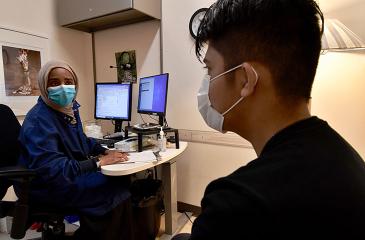Created as affordable health care options, federally-supported community health centers help increase access to crucial primary care by reducing barriers such as cost, lack of insurance, distance, and language for their patients. In doing so, community health centers—also called Federally Qualified Health Centers (FQHCs)—provide substantial benefits to their communities.
Founded by the University of Minnesota in 1966, the Community-University Health Care Center (CUHCC) is Minnesota’s first community health center. Located in the heart of south Minneapolis, CUHCC provides comprehensive team-based care to more than 10,600 patients each year.
“At CUHCC, we are proud to offer whole-person, whole-family care that addresses our patients’ health needs as well as socioeconomic barriers that affect the health of our patients,” said Roli Dwivedi, MD, CUHCC’s interim CEO and chief clinical officer. “We are committed to delivering accessible, culturally responsive care to some of the most diverse and low-income communities in the city and surrounding regions.”
Using an integrated care model, CUHCC offers a one-stop solution where families can receive all their health care under one roof. CUHCC provides primary care, internal medicine, OB-GYN and midwife services, pediatrics, family dental care, and behavioral health services for children and adults.
Many of CUHCC’s patients speak minimal or no English and identify as a person of color, immigrant, or refugee. The majority live below federal poverty guidelines, receive public insurance, or have no insurance at all. These socioeconomic factors create extreme barriers to health and wellness. CUHCC addresses these barriers by ensuring that patients can receive “wrap-around” services on site. These include domestic abuse and sexual assault advocacy, connections to food and affordable housing, pro bono legal services, and care coordination to access other needed supports such as after-school programs. Additionally, CUHCC provides services to everyone who walks through the doors, regardless of their ability to pay.
CUHCC not only serves its community, it is also led by community members. The majority of its independent community board of directors are CUHCC patients and community members. The resulting leadership model—joint governance between the U of M and the community board of directors—combines deep commitment to the community with world-class expertise from the University.
“The community governing board listens and makes certain the clinic meets the needs of the community and represents the clinic in the community,” said Suzanne Burke Lehman, CUHCC’s Board Chair.
In addition to serving the health care needs of its community, CUHCC is the largest teaching health center in the state. CUHCC offers experiential, team-based-care learning experiences for approximately 250 students and residents each year. The training programs are designed to prepare future health professionals to deliver top-notch care, and to inspire the next generation to work and volunteer in community-based health settings.
“CUHCC is essential to combating the primary care workforce shortage and building a workforce dedicated to helping people access cost-effective, affordable health care services. We’re proud and humbled that learners from many health disciplines at the University and other schools choose CUHCC for their training,” says Dwivedi.
National Health Center Week (Aug. 7-13) is an annual celebration with the goal of raising awareness about the mission and accomplishments of America’s community health centers.



